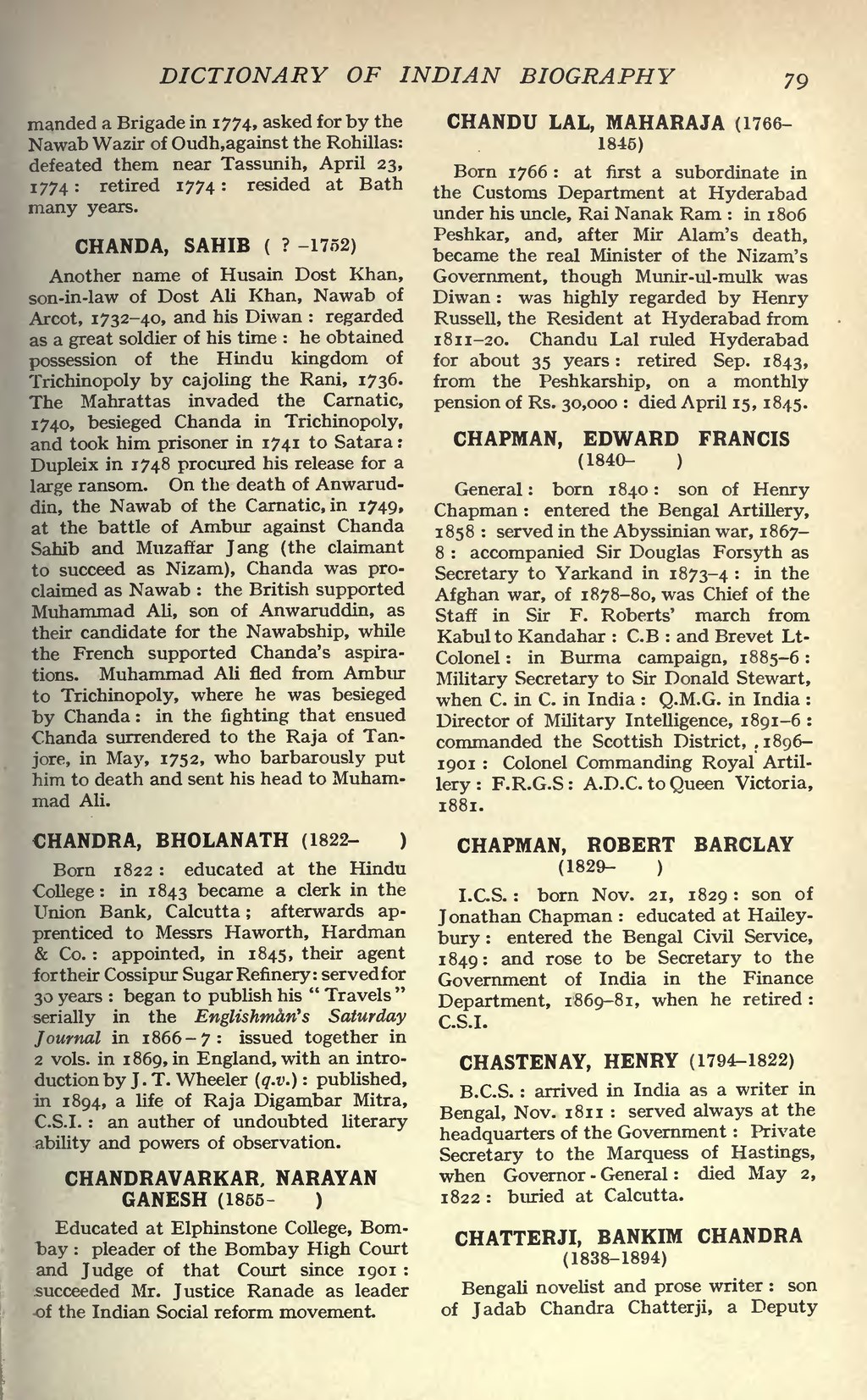manded a Brigade in 1774, asked for by the Nawab Wazir of Oudh, against the Rohillas : defeated them near Tassunih, April 23, 1774 : retired 1774 : resided at Bath many years.
CHANDA, SAHIB ( ? –1752)
Another name of Husain Dost Khan, son-in-law of Dost Ali Khan, Nawab of Arcot, 1732–40, and his Diwan : regarded as a great soldier of his time : he obtained possession of the Hindu kingdom of Trichinopoly by cajoling the Rani, 1736. The Mahrattas invaded the Carnatic, 1740, besieged Chanda in Trichinopoly, and took him prisoner in 1741 to Satara : Dupleix in 1748 procured his release for a large ransom. On the death of Anwarud-din, the Nawab of the Carnatic, in 1749, at the battle of Ambur against Chanda Sahib and Muzaffar Jang (the claimant to succeed as Nizam), Chanda was proclaimed as Nawab : the British supported Muhammad Ali, son of Anwaruddin, as their candidate for the Nawabship, while the French supported Chanda's aspirations. Muhammad Ali fled from Ambur to Trichinopoly, where he was besieged by Chanda : in the fighting that ensued Chanda surrendered to the Raja of Tanjore, in May, 1752, who barbarously put him to death and sent his head to Muhammad Ali.
CHANDRA, BHOLANATH (1822–)
Born 1822 : educated at the Hindu College : in 1843 became a clerk in the Union Bank, Calcutta; afterwards apprenticed to Messrs Haworth, Hardman & Co. : appointed, in 1845, their agent fortheu : Cossipur Sugar Refinery : served for 30 years : began to publish his "Travels" serially in the Englishman's Saturday Journal in 1866–7 : issued together in 2 vols, in 1869, in England, with an introduction by J. T. Wheeler (q.v.) : published, in 1894, a life of Raja Digambar Mitra, C.S.I. : an author of undoubted literary ability and powers of observation.
CHANDRAVARKAR, NARAYAN GANESH (1855–)
Educated at Elphinstone College, Bombay : pleader of the Bombay High Court and Judge of that Court since 1901 : succeeded Mr. Justice Ranade as leader of the Indian Social reform movement.
CHANDU LAL, MAHARAJA (1766–1845)
Born 1766 : at first a subordinate in the Customs Department at Hyderabad under his uncle, Rai Nanak Ram : in 1806 Peshkar, and, after Mir Alam's death, became the real Minister of the Nizam's Government, though Munir-ul-mulk was Diwan : was highly regarded by Henry Russell, the Resident at Hyderabad from 1811–20. Chandu Lai ruled Hyderabad for about 35 years : retired Sep. 1843, from the Peshkarship, on a monthly pension of Rs. 30,000 : died April 15, 1845.
CHAPMAN, EDWARD FRANCIS (1840–)
General : born 1840 : son of Henry Chapman : entered the Bengal Artillery, 1858 : served in the Abyssinian war, 1867–8 : accompanied Sir Douglas Forsyth as Secretary to Yarkand in 1873–4 : in the Afghan war, of 1878–80, was Chief of the Staff in Sir F. Roberts' march from Kabul to Kandahar : C.B : and Brevet Lt-Colonel : in Burma campaign, 1885–6 : Military Secretary to Sir Donald Stewart, when C. in C. in India : Q.M.G. in India : Director of Military Intelligence, 1891–6 : commanded the Scottish District, 1896–1901 : Colonel Commanding Royal Artillery : F.R.G.S: A.D.C. to Queen Victoria, 1881.
CHAPMAN, ROBERT BARCLAY (1829–)
I.C.S. : born Nov. 21, 1829 : son of Jonathan Chapman : educated at Hailey-bury : entered the Bengal Civil Service, 1849 : and rose to be Secretary to the Government of India in the Finance Department, 1869–81, when he retired : C.S.I.
CHASTENAY, HENRY (1794–1822)
B.C.S. : arrived in India as a writer in Bengal, Nov. 1811 : served always at the headquarters of the Government : Private Secretary to the Marquess of Hastings, when Governor-General : died May 2, 1822 : buried at Calcutta.
CHATTERJI, BANKIM CHANDRA (1838–1894)
Bengali novelist and prose writer : son of Jadab Chandra Chatterji, a Deputy
